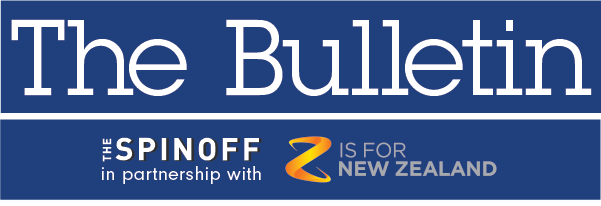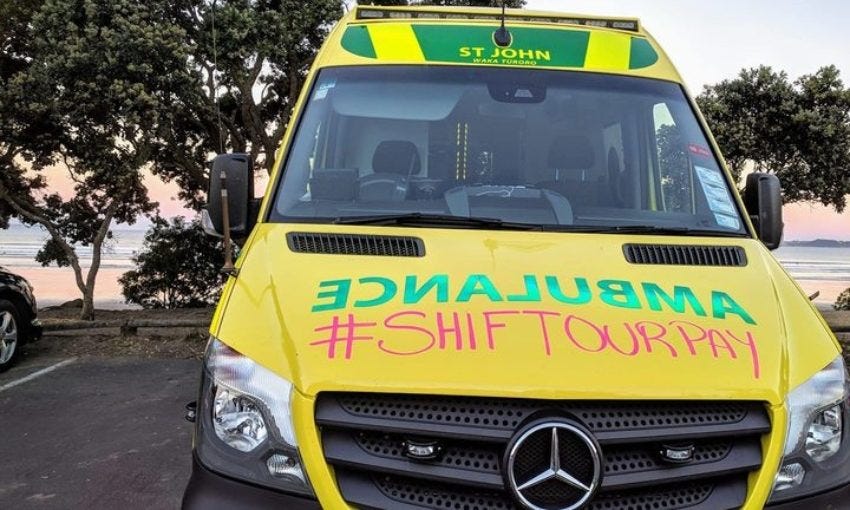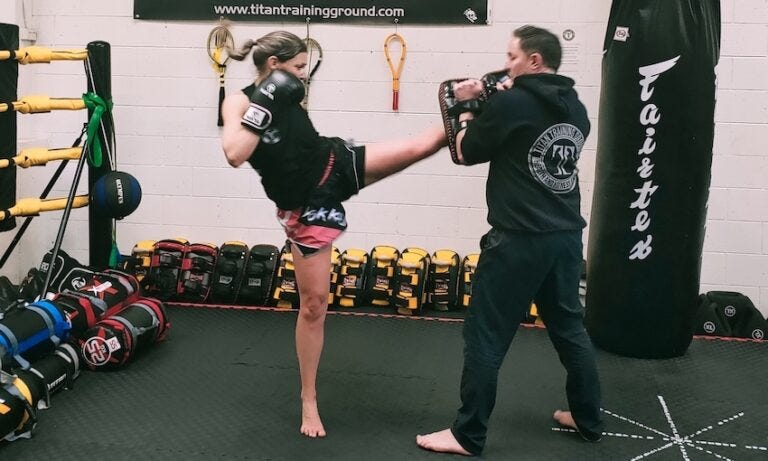Fears for paramedic service after pay boost scrapped
It's another blow for a profession that went through a long bout of industrial action last year

Good morning and welcome to The Bulletin for Monday 29 June, by Alex Braae for The Spinoff. Presented in partnership with Z Energy.
In today’s edition: Fears for paramedic service after pay boost scrapped, rapid report into managed isolation system released, and Greens release sweeping new welfare and tax policy.

Image: One of the messages drawn on an ambulance during industrial action last year. (Source: Facebook – Ambulance Professionals First)
We're going back to last week for today's lead story, but it's a deeply important one with wide implications for the health system. Paramedics are furious at their employers at St John Ambulance for reneging on a promise to weekend and overnight penal rates, reports Checkpoint's Nita Blake-Persen. They were expecting those to be a significant top-up in income, for a job that practitioners say is already underpaid. As one paramedic put it, "it's the same bull s**t that's been going on for years and years and years - they promise you something and then just to shut you up, so the strike's over, and then they take it away from ya. It just guts me."
The fundamental problem for St John is that they don't have the money. The organisation has defended this particular cut, saying that pay increases in senior roles will be frozen, the executive team will be reduced, and personal cars will be scrapped. They're also planning a reduction of about 100 jobs, amid a financial situation the organisation says has got much worse since the penal rates were negotiated. There have been warnings that cuts like this would be coming for a while now, with this story by Stuff's George Block from early June warning of fundraising impacts from the Covid-19 downturn, and the need to find $30 million in savings. The workforce is now considered to be "dangerously low" for the job they have to do.
It also comes after a long and bitter industrial relations battle, which hammered morale among paramedics. And for the wider country, it's a pretty simple equation – if too many paramedics leave, or not enough take up the profession, the service will be less able to prevent deaths and other bad outcomes from accidents and illnesses. Should the government be stepping in? There was a $21 million budget boost in May, to be paid out over two years to "relieve immediate pressure". But the calls keep growing louder for a fully funded nationwide ambulance service that doesn't have to rely on charitable donations.
Just quickly, a message from The Spinoff's managing editor Duncan Greive:
"The arrival of Covid-19 and lockdown changed The Spinoff, transforming our editorial to focus on the biggest story of our lives, taking a small team and making it a seven day a week news operation. But it also fundamentally changed us as a business, too. Prior to the crisis, around 20% of our editorial costs were funded by our Members. Now, that figure is north of 50%. The loss of some key commercial clients meant that change has to be permanent. If you're already a member, please know that all at The Spinoff are incredibly grateful for your help. If you're not, and can afford to contribute, please consider doing so – it really is critically important to our ability to cover the next phase of the crisis, in all its complexity."
A rapid report on the country's quarantine and managed isolation system has been released, painting a picture of an under-resourced, uncoordinated and ad hoc system. The Spinoff's Alice Neville has put together a wrap of the key points of the report – in short, it has called for a focused revamp of the system so that it is clear who is in charge of what. Minister Megan Woods, who basically got brought in to sort the mess out, said "actions are being taken swiftly to address all the issues that this review has identified” in response. It doesn't appear that any of the botches had serious negative consequences, as a week after the worst of them there is still no evidence of community transmission.
Two of the parliamentary parties made big announcements over the weekend. For the Greens, it was a policy announcement on how they'd completely overhaul the welfare system, with a guaranteed weekly income for all those not in full time work, paid for by new tax brackets on higher incomes, and a new wealth tax. Stuff's Henry Cooke has a comprehensive wrap on what is being proposed, and how they'd go about implementing and paying for it – for good measure, he also wrote about a particular aspect of the wealth tax which will mean most family homes will be excluded. I've simplified heavily here, because it really is quite a complicated set of policies, but the party insists it is fully costed out, and the increased costs will be borne only by the wealthiest share of the population.
As the first big agenda setting idea of the election campaign, the reaction from other parties has been pretty visceral. Newshub reported on criticism from National and Act, and there were also attacks made by NZ First leader Winston Peters, Opportunities Party leader Geoff Simmons, and Social Credit. But the Council of Trade Unions put out a release welcoming an announcement. As for the one party that really matters on implementing it, we're still yet to hear from the Labour party – the only realistic path back to government for the Greens goes through Ardern and Robertson, so their take on it all will be crucial.
Meanwhile, the Act Party released their list including a prominent gun rights advocate in a top position. The NZ Herald reports Nicole McKee, spokesperson for the Council of Licenced Firearms Owners, will be placed 3 on the list, which on current polling will see her get into parliament. The first time candidate says she was compelled to stand in opposition to "emotive and rushed legislation that adversely affects those it is intended to support". The party's new deputy leader is former parliamentary staffer Brooke van Velden – she has replaced former deputy Beth Houlbrooke, who will drop down to 13. There's two David Seymours on the list, but the one you'll be more familiar with has stayed in the top spot.
For Pasifika overstayers, the fear of being deported could prevent them from seeking medical treatment – and that could bring with it big risks if there is a Covid-19 outbreak. One News has covered the issue, along with the calls from community leaders to address it by simply granting overstayers residency. We don't really know how many people fall into this category for obvious reasons, but it is thought to be somewhere in the thousands. Overstayers are also at risk of exploitative employment practices, and often have to live in poor quality and overcrowded houses.
Things are getting very tough for many in the Otago/Southland region, an area hit hard by the loss of tourism. Crux's Kim Bowden reported on social service organisations in Queenstown having to turn people away, because demand has been too high. What's worse is that for many the sense of economic despair is starting to become a 'new normal'. Radio NZ had some numbers on this – between February and last Friday, the number of work-ready people on the Jobseekers has gone from 29 to more than 500 in Queenstown alone.
Concerns are being raised about high numbers of mako sharks being killed by commercial fishing operations. Newshub's Michael Morrah has reported on the issue, with 1200 caught over the past year, which can have a damaging effect on the wider ocean ecosystem. These are just the sharks that have been reported as well, and incredibly, boats that have a neutral observer on them report a higher level of by-catch – you can draw your own conclusions about that. The Department of Conservation says the species is "not threatened", but internationally the species is considered endangered.
From the Friday files: I'm briefly bringing this back because we had another round of documents being released at the end of last week. The full collection can be read here, and I've picked out a few interesting nuggets here.
Got some feedback about The Bulletin, or anything in the news?
Drop us a line at thebulletin@thespinoff.co.nz

Right now on The Spinoff: Boyd Swinburn writes about the wider societal systems that determine health and wellbeing, which were largely absent from the recent Simpson report. Liang Cui writes about how Covid-19 has made anti-Asian racism worse than it already was. Rachel Williamson writes about taking up a martial art, and how it helped teach her to stand up for herself. Isabella Lenihan-Ikin from NZUSA writes about the concerns many students have with the rush to move classes online. Sam Brooks interviews Nadia Lim about teaching a generation of people how to cook, and filming a new show during lockdown. Mark Amery writes about the teaching of art in schools, and how it has fallen away.
And for a few fun bits and pieces: Duncan Greive reviews the intriguing looking TV drama Head High, set in the brutal world of Auckland school rugby. Tara Ward goes back and watches the iconic first ever episode of Big Brother Australia. And Calum Henderson has taken on the ridiculous task of ranking almost a dozen different formats of cricket.
For a feature today, an excellent piece about the coming boom in major women's sports events coming to New Zealand. Writing on the Sportsfreak blog, Harbour Heather has looked at the upcoming Cricket World Cup, Rugby World Cup, and Football World Cup – three massive tournaments which will all be hosted by New Zealand. In particular, she's written about how it could change sporting culture in this country. Here's an excerpt:
I get emotional thinking about the answers to that. How young girls in this country will get to witness strong, athletic, talented women living their sporting dreams, some of them with the fern on their chest. How those who are playing cricket, rugby and football will see what’s possible for them, with application and dedication. How girls who don’t play those sports, or any sports, get to witness females centre stage, hear and watch the stories of these strong female characters in the very best version of reality TV, live sport.
We’ve hosted the women’s cricket World Cup before. But there’s something in the air around women’s sport at the moment. While there’s still some way to go, we’re standing on a platform of contracts, sponsorship, broadcasting and visibility we’ve never had before.
When I say we, I don’t mean women. I mean all of us.
In sport, the biggest story of the weekend has been the Warriors teetering on the brink of collapse. It was bad enough on the field – a 50-6 drubbing from the Melbourne Storm. But the real damage was done by the news that several players really are serious about coming home to be with their families. Stuff had an update yesterday, with the club's CEO Cameron George saying the Warriors would definitely see out the season, even if the four players jump on a plane back here. In fairness, the quartet have got a point – they only went to Australia in the first place on the condition that their families would get exemptions to enter the country, and that still hasn't happened. There are still several months worth of games to play, and it's fair to say it could be a tough season for fans.
That's it for The Bulletin. If you want to support the work we do at The Spinoff, please check out our membership programme




